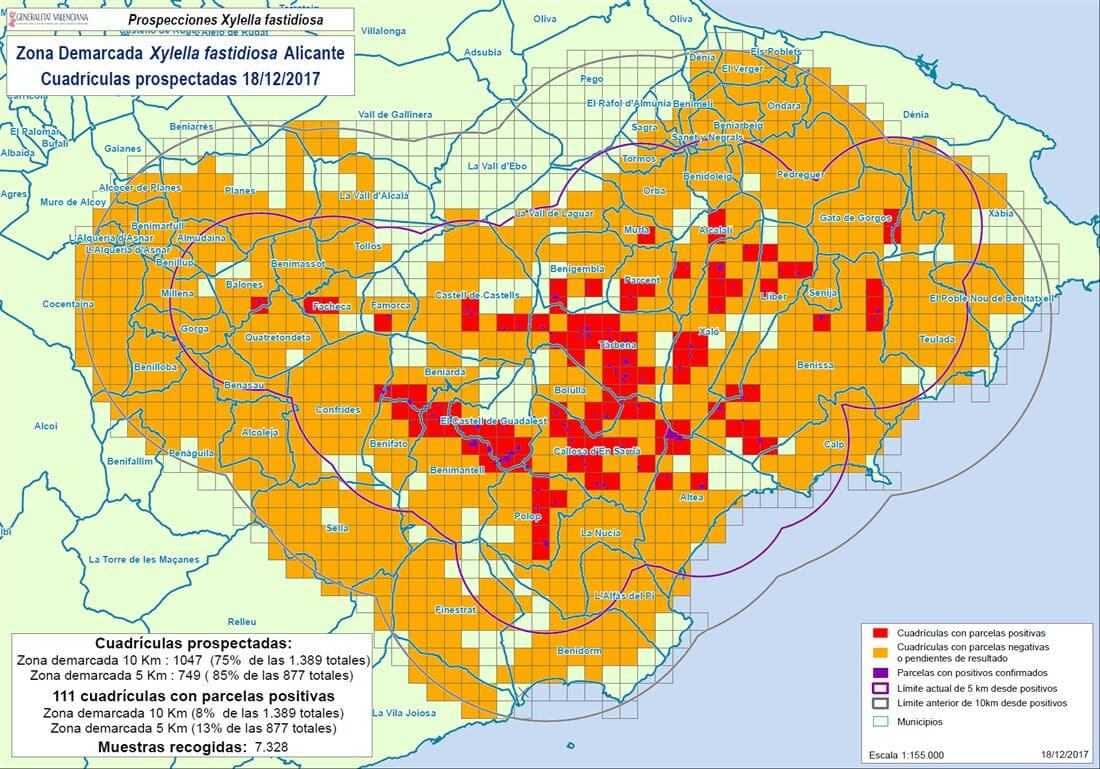Farmers Protest Eradication Plan in Spain
The fifth outbreak of Xylella fastidiosa in six months has led the Spanish government to take drastic measures as it tries to prevent the spread of the plant pathogen.
 Data from surveys of Xf cases in Alicante province
Data from surveys of Xf cases in Alicante provinceProtesters in Alicante will formally petition the Ministry of Agriculture, Environment, Climate Change and Regional Planning to halt the destruction of healthy olive and almond trees in the region.
The Platform for those Affected by Xylella fastidiosa in Alicante (AXFA) presented their appeal at a general assembly meeting in Castell de Guadalest.
Destroying healthy, rain-fed trees is an ecological and landscaping aberration that, if it occurs, will mark the beginning of the end of our forests, of our people, of life in these areas.
The appeal was approved and now the group, which is composed of more than 100 local farmers, will submit it in court.
According to Adolfo Ribes, the AXFA spokesman, the appeal is necessary to temporarily stop the destruction of healthy trees as well as to begin legal procedures for the implementation of a containment plan.
“The Valencian administration has not dared to defend us, neither before the rest of the Autonomous Communities of our country, nor before our Ministry nor before Brussels,” he said.
“ASAJA Alicante and AXFA have a firm conviction that destroying healthy, rain-fed trees is an ecological and landscaping aberration that, if it occurs, will mark the beginning of the end of our forests, of our people, of life in these areas.”
This is the fifth outbreak of the plant pathogen in the region since June. Due to the frequency of the outbreaks, the European Union (EU) has told the Spanish government that it will provide funds for the eradication plan stipulated by the European Commission.
“Strict eradication measures apply, consisting of a clear cut of all host plants of the specific subspecies of Xylella fastidiosa, irrespective of their health status, in a radius of 100 meters around the infected plants,” an EU spokesperson said.
“Although these measures impact on the local agro-economy, they are needed in the interest of the Union as a whole in order to preserve EU agriculture, as well as public and private gardens.”
The EU’s rigorous eradication plan was made and approved with numerous scientific consultations. The plan would involve destroying countless more trees than those that are infected, which has led to widespread protests in Alicante.

Data from surveys of Xf cases in Alicante province
“Razing all of the trees, both the healthy and the sick, is not the solution, because we are no longer isolated cases,” Eladio Aniorte, the president of ASAJA Alicante, said. “The infestations have spread to three regions, and there is a high probability that new outbreaks will be announced soon.”
Aniorte and Ribes have both called on the Spanish government to publish the results of more than 7,000 test samples it has taken in order for all those affected to know the true scope of the disease.
Aniorte said a containment plan could be equally effective without incurring massive damage to the region’s agricultural sector. He also pointed out that Alicante is especially important to Spanish agriculture since it receives more rainfall than neighboring communities, which also grow olives and almonds.
“We can not understand why the Council does not work to bring to the Ministry and Brussels a containment plan that replaces the eradication plan,” he said. “It’s an equally effective protocol to prevent the spread of the infestations, but less aggressive with those affected and the territory.”
Xylella fastidiosa has plagued southern Italy for five years now, forcing the government to cut down tens of thousands of olive trees. Farmers in Italy have protested and also question whether the EU’s method is effective.
Back in Spain, farmers and ministers are both concerned about the potential for the continuing expansion of the disease, even if they do not agree on how to stop it.








